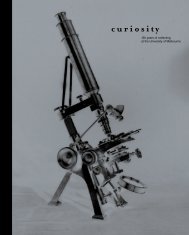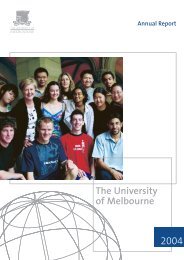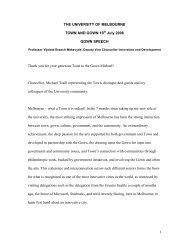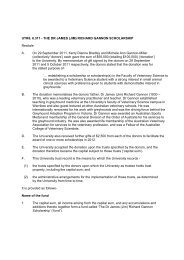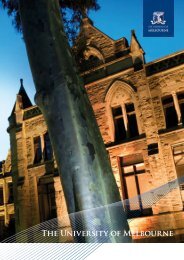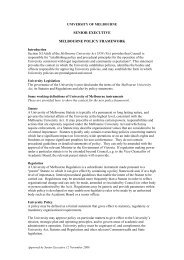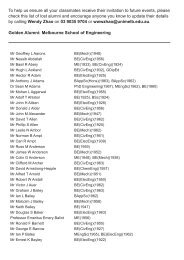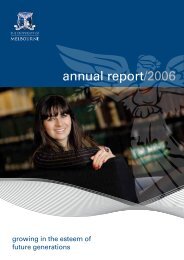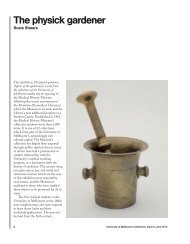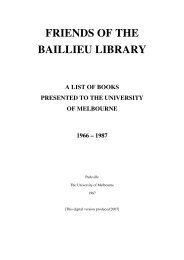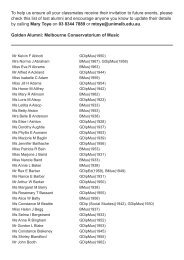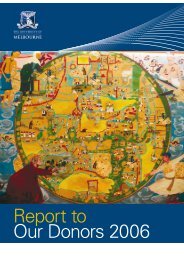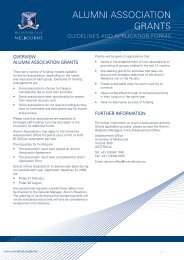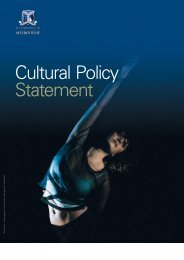2010 International Undergraduate Prospectus nts. u.au
2010 International Undergraduate Prospectus nts. u.au
2010 International Undergraduate Prospectus nts. u.au
Create successful ePaper yourself
Turn your PDF publications into a flip-book with our unique Google optimized e-Paper software.
Melbourne JD (Juris Doctor)<br />
Duration and campus<br />
3 years full-time Q<br />
Parkville<br />
Q Acceleration is possible by taking subjects in the<br />
summer and winter breaks, subject to approval,<br />
leading to completion of the course in just over two<br />
years.<br />
Entry requireme<strong>nts</strong><br />
An undergraduate degree in a discipline<br />
other than Law or a degree in Law from<br />
a different legal system. All applica<strong>nts</strong><br />
must meet the English requireme<strong>nts</strong> of<br />
the University of Melbourne. W<br />
W Applica<strong>nts</strong> who have not obtained a university degree<br />
from an institution at which English is the language of<br />
instruction and assessment may meet these English<br />
requireme<strong>nts</strong> in a variety of ways: IELTS (academic<br />
English only) – overall score: 7.0 with a minimum score<br />
of 7.0 in Academic Writing and no band less than 6;<br />
or TOEFL (paper-based): 610 + TWE 5.0; or TOEFL<br />
(computer-based): 253 and the score of Essay Rating<br />
5.0; or TOEFL (internet-based): 102 + written score of<br />
24 and no band less than 21.<br />
Extra requireme<strong>nts</strong><br />
Law School Admission Test (LSAT)<br />
Personal statement (up to 850 words).<br />
Selection criteria<br />
Your application will be selected based<br />
on your academic results achieved in<br />
previous tertiary studies, score in the<br />
Law School Admission Test (LSAT), and<br />
your personal statement. No single one<br />
of these criteria is determinative. The<br />
selection criteria are used collectively<br />
by the School to determine whether<br />
applica<strong>nts</strong> are suited to study graduate<br />
Law at the level at which it is offered in<br />
the Melbourne JD.<br />
More information<br />
Melbourne Law School<br />
t +61 3 8344 8912<br />
f +61 3 8344 0106<br />
e jd-law@unimelb.edu.<strong>au</strong><br />
w www.jd.law.unimelb.edu.<strong>au</strong><br />
Course description<br />
The Melbourne JD is a three-year, full-time<br />
course t<strong>au</strong>ght over six semesters. The<br />
teaching year begins in February, and<br />
prospective stude<strong>nts</strong> should apply in the<br />
preceding year.<br />
The course comprises 24 subjects, of which<br />
17 subjects are compulsory. Stude<strong>nts</strong><br />
usually remain in the same cohort to<br />
complete the compulsory subjects. You<br />
may choose the remaining subjects from<br />
the options available for the Melbourne JD<br />
and the Melbourne Law Masters.<br />
Compulsory subjects are: Legal Method<br />
and Reasoning; Principles of Public Law;<br />
Torts; Obligations; Dispute Resolution;<br />
Constitutional Law; Contracts; Property;<br />
Legal Theory; Administrative Law; Trusts;<br />
Criminal Law; Corporations Law; Remedies;<br />
Evidence and Proof; Legal Ethics; Legal<br />
Research.<br />
Elective or optional subjects are built into<br />
the second and third years of the Melbourne<br />
JD curriculum. This allows you to pursue<br />
particular interests in depth or to develop<br />
your knowledge in current and emerging<br />
fields of law. Certain core electives will be<br />
offered each year or every second year,<br />
including: Intellectual Property; Private<br />
<strong>International</strong> Law; Public <strong>International</strong> Law;<br />
Taxation; Family Law; Employment Law;<br />
Advocacy; Competition Law.<br />
Creating a world of career<br />
opportunities<br />
The Melbourne JD is a versatile qualification<br />
well-regarded by a huge range of employers.<br />
It is important to note that employers of<br />
our Law graduates are not just law firms<br />
– they are also management consulting<br />
companies, financial institutions, NGOs,<br />
aid organisations and government<br />
departme<strong>nts</strong> such as the Department of<br />
Foreign Affairs and Trade, to name just<br />
a few. Your Melbourne JD can also be<br />
used as a stepping stone into merchant<br />
banking, industrial relations, human rights,<br />
journalism and the media. Corporations,<br />
statutory <strong>au</strong>thorities and the public service<br />
also recruit Law graduates directly into their<br />
management training programs.<br />
Professional and international<br />
degree recognition<br />
The JD is internationally recognised, and<br />
is highly regarded by law firms and other<br />
employers of Law graduates. The study<br />
of a first degree in Law at graduate level<br />
is increasingly becoming the international<br />
standard with the JD qualification offered by<br />
leading Law schools in the United States,<br />
Canada and Hong Kong. The Melbourne JD<br />
leads to admission to the legal profession in<br />
all Australian jurisdictions, and can be used<br />
as a basis for seeking admission in many<br />
common law jurisdictions overseas.<br />
Master of Music Therapy<br />
Duration and campus<br />
2 years full-time<br />
Parkville<br />
Entry requireme<strong>nts</strong><br />
A Bachelor of Music or Bachelor of<br />
Music Education degree (or equivalent),<br />
of at least three years duration, or<br />
A Bachelor degree in an allied field (e.g.<br />
teaching, occupational therapy, nursing<br />
etc.) plus a high standard of achievement<br />
in music performance (equivalent to eigth<br />
grade A.M.E.B.), music history (equivalent<br />
to at least one-year study at tertiary level),<br />
and in music theory (equivalent to at least<br />
fifth grade A.M.E.B.).<br />
All applica<strong>nts</strong> must have successfully<br />
completed at least two Psychology units<br />
at tertiary level.<br />
Extra requireme<strong>nts</strong><br />
Yes. See details below.<br />
More information<br />
School of Music<br />
t +61 3 8344 5256<br />
f +61 3 8344 5346<br />
e via http://music-unimelb.custhelp.com<br />
w www.music.unimelb.edu.<strong>au</strong>/courses/<br />
pgrad/index.html<br />
Extra requireme<strong>nts</strong><br />
Audition: An <strong>au</strong>dition tape/CD will be<br />
required for all applica<strong>nts</strong>. The purpose<br />
of this is to enable assessment of the<br />
applicant’s music performance ability and<br />
the level of musicianship.<br />
References: Three references are required:<br />
one character reference, one academic<br />
reference, and one from a person who can<br />
attest to the applicant’s musical ability.<br />
Example of Academic Writing: Applica<strong>nts</strong><br />
must demonstrate proficiency in academic<br />
writing, by submitting 3,000 words that<br />
demonstrate an ability to review and critique<br />
literature and use a consistent referencing<br />
style.<br />
Interview: An interview will be required<br />
for all applica<strong>nts</strong> as part of the selection<br />
procedure.<br />
Police Checks: Stude<strong>nts</strong> are required<br />
to undergo, at their own expense and<br />
arrangement, a police check prior to the<br />
commencement of their course.<br />
It is strongly recommended that<br />
applica<strong>nts</strong> have some experience of<br />
89



